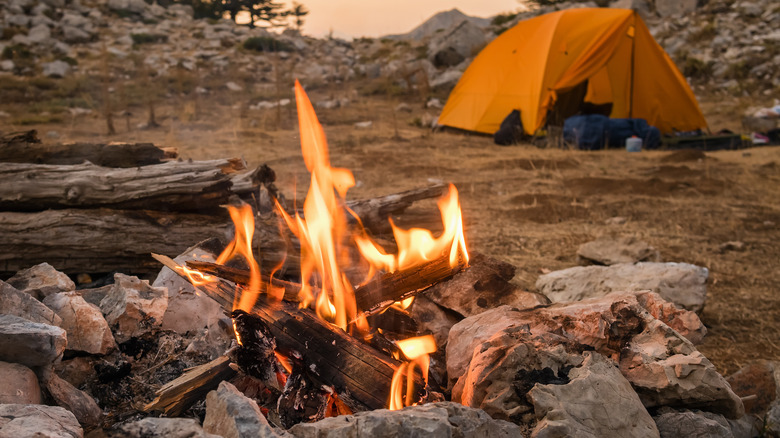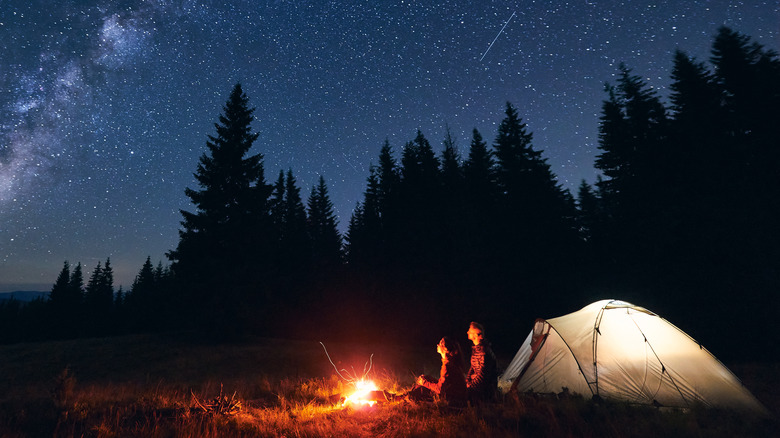Think Twice Before Bringing Your Own Firewood To A Campsite
For campers, nothing stirs the imagination quite like the idea of listening to a crackling fire while feeling its warmth and staring into a star-filled sky. Sitting around a campfire, telling stories, making smores, and watching tendrils of smoke stretch into the starry abyss are time-honored traditions for campers.
With that in mind, it only makes sense to load up with firewood while packing for your next camping adventure, right? Well, perhaps not — depending on which campground in the United States you're looking to visit, there are a few reasons why you might want to leave that stack of firewood at home. Throughout the U.S., regulations are in place regarding the transport of firewood. These rules are designed to prevent the introduction of damaging fungi, diseases, and invasive species. So, gathering your wood at the campsite instead of bringing it from home could very well keep you out of (legal) trouble as well as ensure the well-being of the area's flora and fauna.
Responsible camping means knowing the regulations
Camping is one of the simplest ways to escape modern society, if only temporarily. However, campers should be ever mindful that even when isolated deep in the depths of nature, society's rules, regulations, and laws still apply. Many people are unaware that the movement of firewood, an element that seems so basic, is regulated in all 50 states. As a responsible camper and citizen, it is imperative to know the regulations before embarking on a camping trip. Not knowing these regulations is one of the biggest mistakes campers can make when it comes to building a campfire.
The National Park Service sets general guidelines for campers and regulates the use of firewood within its parks. Each state's park service does the same for its public lands. However, keep in mind that many regulations (and all the guidelines) for moving firewood apply to private land as well. The easiest way to stay abreast of these regulations is to reference the Firewood Map.
Even without referencing the map or guidelines from various agencies, there are a few fairly universal guidelines to follow, according to the National Park Service. For one, it is generally a no-no to move firewood across state lines. For those living along an international border, bringing firewood into the U.S. from either Canada or Mexico is strictly regulated. When it comes to movement within a state, 10 miles is the general rule of thumb for what is considered an acceptable transport distance.
Avoid introducing invasive species and disease
People camp to be outdoors and enjoy nature. They often travel to other destinations to see different types of landscapes, plants, and wildlife than they get to see close to home. Unfortunately, invasive species have become a common issue in many areas, according to The Nature Conservancy. While most of the headlines regarding invasives tend to center around jaw-droppers like dangerous snakes and large reptiles, dozens of invasive species, ranging from micro-organisms to grasses to insects, can be and often are transported in firewood.
While their presence may not be as attention-grabbing or obvious, unwanted guests transported in a load of firewood can alter the local environment in devastating ways. Many invasive plants can overrun an environment. Insects can destroy native plant and insect species and disrupt the food chain. Fungi and disease can infect, harm, and even kill plants and trees. The further away from home you are traveling on your camping excursion, the more likely it is you could be introducing invasive species by bringing your own firewood.
Keep in mind that the transport and the introduction of invasive species work both ways. That means firewood brought home from campsites can bring new pests and diseases quite literally into your own backyard. So, to be safe, collect or buy firewood locally and leave what you don't use behind for future campers to use.


